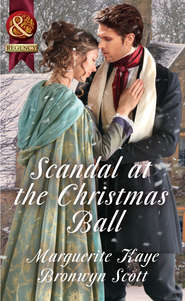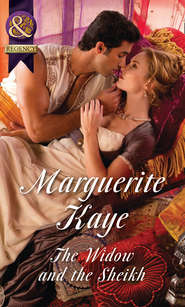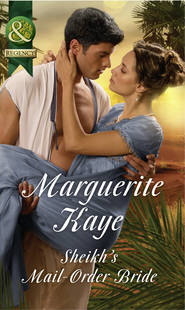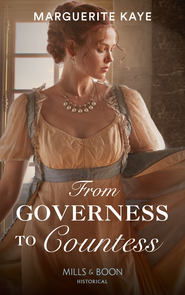По всем вопросам обращайтесь на: info@litportal.ru
(©) 2003-2024.
✖
Unwed and Unrepentant
Настройки чтения
Размер шрифта
Высота строк
Поля
He still had presence too. Barely a falter in his step there was, as he nodded curtly, as if it had been a few days since last they had met. The atmosphere in the book room changed too, when he took his seat behind the desk. She had forgotten that about him. He was like a necromancer, conjuring moods at will. She was already tense, her toes curled inside her kid boots, her shoulders straight like a soldier on parade, and it was too late to relax, because his eyes were upon her and he was drumming his fingers, his chin resting on one hand. But she was no longer a child, and had, for nine years, perforce, to consider herself no longer his daughter. He had not the right to judge her, and she was not inclined to permit him to do so.
Silence stretched. Another of his tricks, but it was one which Cordelia had also acquired. By the time he raised his brows after what seemed like an eternity, she had herself under control.
‘You are looking surprisingly well.’
‘Yes,’ she replied with a cool smile. She waited, listening to the clock on the mantel ticking. It always seemed to tock much louder than it ticked, counting out the seconds like a measured, doom-laden tread towards eternity. She wondered, as she had so many times before, if he had had it adjusted to do so.
Finally, her father spoke. ‘Almost a decade ago you absconded from these premises, leaving devastation in your wake. I shall never understand what I did to deserve such ingratitude, nor such a flagrant flouting of my will.’
‘Your will!’ The words were out before she could stop them. ‘What about my will, Father? Did you ever stop to consider...’
‘Unlike yourself, I never act without a great deal of consideration.’
Lord Armstrong steepled his fingers and eyed her across the expanse of polished walnut. Furious with herself, Cordelia bit her lip, grateful that the layers of corsets and stiffened petticoats which her robe required, concealed her heaving chest. ‘I did not request this interview to discuss the past, but the future,’ she said.
‘Indeed? You do not think the past pertinent, then? You do not feel it incumbent to explain how you have spent your years...’
‘In exile? In the wilderness?’
‘Outwith the shelter of your family,’ Lord Armstrong concluded smoothly.
‘No,’ Cordelia said baldly. ‘Caro and Cressie informed you that I was well,’ she continued, unable to tolerate another lengthy silence. ‘They also informed you that should you wish to contact me, you could do so through either of them. You did not, I must assume because you were not interested or did not care. Both most likely. So no, I don’t think it either pertinent or—or incumbent upon me to explain myself,’ she concluded hurriedly, realising that she was on the brink of doing just that.
She glared at him, defying the stupid, stupid tears to fall. He didn’t care. It made it so much more humiliating to discover that she, after all, cared a great deal.
‘You are thirty years of age,’ Lord Armstrong said.
‘Next month,’ Cordelia replied cautiously, wondering where this new tack would lead.
‘And still, I assume, unmarried?’
‘May I ask why you make such an assumption?’
Her father smiled thinly. ‘Though I am sure we would both rather the case were otherwise, you are my daughter, and I do understand you. You would not be here playing the supplicant had you any other means.’
‘You don’t think my sisters would support me?’
‘I don’t think you would accept their support,’ Lord Armstrong retorted.
The truth of this made her determined to destroy that smug certainty of his. ‘The possibility of my having a dependant of my own has not occurred to you, I suppose,’ Cordelia said.
Her father looked fleetingly appalled, but his expression was quickly veiled. ‘Even you, Cordelia, would not have the temerity to foist a bastard upon the family.’
Even she! Thinking of her sisters’ various exploits, Cordelia was forced to repress a smile. Marriage, no matter how belated, had obviously mitigated their actions in her father’s eyes, despite the fact that not a single one of those marriages had been of his making. How pleasant it must be, to bend the facts to one’s perception, as he did. She doubted he ever had trouble sleeping at night, and wished fleetingly that she too, had the knack of looking at the world through a window of her own making.
But she had not, and she did not really wish to be cast in her father’s mould. What she wanted, more than anything, was to be out of this room and this house as quickly as possible. There would be no conciliation, no regrets or apologies nor even a passive acceptance. ‘I didn’t come here to beg your forgiveness, Father,’ Cordelia said. ‘I’m sorry to disappoint you, but nor am I in need of support, monetary or moral.’
To anyone who did not know him, his face remained impassive, but Cordelia did know him. Lord Armstrong sat a little straighter. His eyes lost that deceptively faraway look. ‘You will explain yourself.’
‘Contrary to your expectations, these last nine years have been most productive and extremely enjoyable. I do not regret an action or a moment.’ Which was mostly true. ‘However, I am tired of my itinerant life, and I wish to settle back home, here in England. I do not need your help with this as I have more than adequate means for the purchase of an estate.’
She waited, but Lord Armstrong seemed rather stunned. Cordelia hugged her satisfaction to herself. ‘My sisters were of the opinion that you had changed, that you would regret the enmity between us. I hoped rather than believed they were right, just as I hoped rather than believed that you would apologise for the wrongs you have done me. Sadly, you have lived down to my expectations, Father. It behoves me only to inform you that I intend to re-establish contact with my family, regardless of your wishes.’
She was rather pleased with this little speech, and her own unwavering delivery. If she was expecting it to have any impact on her father, Cordelia was, however, destined to be disappointed. ‘I wonder why, since you are so unrepentant and so confident in achieving your aims, you have not returned before now,’ Lord Armstrong said. ‘To be plain, if you truly cared so little for my opinion, Daughter, I wonder that you did not simply disregard it.’ His lordship once more steepled his fingers. ‘Your silence, as they say, speaks volumes, Cordelia.’
‘My silence,’ she retorted through gritted teeth, ‘is testament to the effort I am making not to tell you what I think of you, Father. I came here to draw a veil over the past, but you will not allow it. I have done as you bid me for almost ten years, making no attempt to contact my family...’
‘You do not, then, count your sisters?’
‘Caro and Cressie had nothing to lose. I have not written to Celia or Cassie. I have not written to Aunt Sophia. Or...’
‘Spare me the litany,’ Lord Armstrong said, rising from his seat and leaning over the desk. ‘Rather let me set the record straight, Cordelia. My wife will ensure that any attempt to contact your half-brothers or Isabella will be unavailing. I myself will speak to Sophia. Her sense of what is owed to a brother will dictate her actions, as it always has.’
Cordelia also got to her feet. Though she had quelled the urge to shrink back in her chair, she was nevertheless horrified. She was also deeply hurt, humiliated and absolutely furious with herself for having given him the chance to hurt and belittle her again. ‘I don’t believe you. I shall not listen to you. I don’t need your permission or your forgiveness. I will allow no one—no one!—to dictate my actions other than myself. I thwarted you—there, I have said it—by refusing to marry a man of your choice, and you have held a grudge against me for ten years. Unbelievable! You are utterly unbelievable, Father.’
She began to gather up her things, her hands shaking with anger. Jamming on her bonnet anyhow, she bit the inside of her cheek very, very hard. So intent was she on getting out of the house before she broke down, that she did not notice the door to the book room opening until the same impassive servant, who had no doubt heard the muffled altercation, was standing in front of her father holding out the silver salver. ‘Your twelve-thirty appointment has arrived a little early,’ he said.
‘It’s fine. I’m leaving,’ Cordelia said. Snatching her shawl from the chair, she caught a glimpse of the card on the tray before her father picked it up, and her heart, already beating like a wild thing, skipped a beat. It could not be. Looking up, she found her father’s gaze on her. ‘You know, it may very well be in your interests to remain for this meeting,’ he said.
He had that faraway look. Considering. Scheming. She began to feel sick again. ‘No,’ she said, though her voice seemed to come from a long way away, because he had put the card back down on the desk, and she could read it.
‘Politics,’ he continued smoothly, as if she had not spoken, another of his tactics, ‘is all about compromise. I will concede that I cannot stop you from attempting to do as you say. You will fail, but your attempt, I will also concede—you see what I mean about compromise—will be unpleasant. For all of us.’
She stared at him. Her body was screaming at her to run. Her mind was struggling to deal with her father’s admission that he was— What, fallible? No. But he seemed to be offering her a deal. What deal? She looked at the card on the desk, but it made no sense, and the instinct to run got the upper hand. ‘No,’ she said, turning towards the door just as it opened, crashing full tilt into the man entering the room.
‘Ah, Mr Hunter,’ her father said, urbane as ever, ‘let me introduce you to my daughter Lady Cordelia.’
Chapter Two
Broomilaw, Glasgow—1836
Cordelia stood on the aft deck of the PS Argyle as the paddle steamer chugged down the River Clyde on the last stage of her journey. After several weeks travelling in the Highlands, the change to this vast city was almost overwhelming. The air was thick with smoke, tasting distinctly of coal, the clouds in the tarnished sky above were a strange metallic yellow colour.
Argyle sounded her horn, a loud, low, mournful cry that made the deck vibrate, and sent a noxious plume of black smoke into the air from the high stack of funnel as she began to slow, narrowly avoiding a large three-masted clipper anchored in the centre of the channel. The sound of the water being churned up by the two huge wooden paddles changed from a torrent to a slow slap as they drew alongside their berth, scraping between a host of other craft—so many, it seemed to Cordelia, that every ship in Scotland must be vying for space here in Glasgow.
The docks were crowded as she picked her way carefully over the narrow wooden gangway from the Argyle, across the deck of another steamer and up on to the pier, clutching her portmanteau. Beautiful as the Highlands had been, she had felt more alien there than at any time since leaving London eight years before. The Gaelic language, with its soft, lilting tones, was lovely to listen to, impossible to decipher. She had not been prepared for her own English accent to mark her out as foreign. At times, she had encountered downright hostility. They had long memories, those whose families had paid the price for fighting for the Jacobite Prince Charlie. More recently, enclosure and the introduction of sheep to the lands had brought a new grudge against the Sassenach landowners. Cordelia, raised in a household which lived and breathed the politics of Britain’s growing Empire, had been appalled by her own ignorance of what was, in theory, part of her own country.
On a very small scale, politics had torn her own family apart. Listening to the tales of what politics had done to the Highlanders gave her rather a different perspective on her own life. In those remote, tiny, hard-working communities, family was all. Cordelia could no longer ignore how much she missed her own. She was lonely. There were times when the cost of this independent path she had chosen felt like too high a price to pay. Times, such as now, standing on the quay with the crowd pressing round her, when she would have given anything for a familiar face.
But she had never been one to mope, had always loathed regrets, and there was no point in wishing things could be different. Cordelia turned her mind to the problem of her baggage, and where, and how she was supposed to collect it. Jostled, her skirts and toes well and truly trodden on, she looked for a porter. There were many, but all were occupied, and all seemed to be deaf too. She had thought that being back in a city would restore a little of her equilibrium, but the harsh language here sounded almost as foreign as Gaelic.
‘And to make matters worse, I seem to have become invisible,’ she muttered to herself, resorting to using her elbows to push past a large man holding a very loud conversation with a very small man on one of the steamers.
It was then she saw him, standing quite alone a few yards down, at the end of the quay. She could not have said what drew her attention, only that it was drawn, almost as if she were compelled to look at him. He was dressed sombrely, in a black coat and trousers, black shoes. His hair was cut short. Deep auburn, it was burnished by the silver-yellow rays of the setting sun filtered through the darkening clouds, giving him the look of a fallen angel. He had been staring off into the distance, but as she watched him he turned, their eyes met, and Cordelia felt a jolt of recognition, though she was sure she had never seen him before. Perhaps it was from having listened to too many ghost stories while she was in the Highlands, but she had the strangest feeling, like seeing another form of herself. You, her bones and her skin and her blood called, it’s you.
She couldn’t look away. It was with a feeling of déjà vu, or fate, inevitability, that she watched him approach her. His face was not gaunt, but it had little spare flesh. The lines which ran from his nose to his chin spoke of a tough life rather than either age or decadence. A hard face with a strong chin and nose, his mouth was his only soft feature, with a full bottom lip forming into a querying smile. The quiver inside her turned from recognition to attraction. This one, her body was saying now, this man.
‘Is there something I can do for you?’ he asked.











